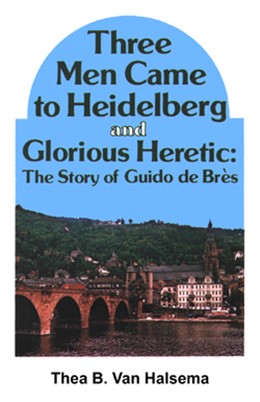Book Review: Three Men Came to Heidelberg and Glorious Heretic: The Story of Guido de Bres
<- Back
Three Men Came to Heidelberg and Glorious Heretic: The Story of Guido de Bres
Book Author: Thea B. van Halsema
Review Author: Narello
Kelmscott Free Reformed Church
Pro Ecclesia Bookshop
1992/126 pages
I believe … REALLY? What do you believe? What do I believe?
Thus, begins a new - a fresh look at the origins of the Heidelberg Catechism and the Belgic Confession.
A book based on the real lives of men and women of the faith - a prince, a preacher and a professor - of lives seemingly far removed from the 20th century. Of castles, and intrigue, and malicious backstabbing. A drowning, a vow, and a determination for the truth. Of Heidelberg, of hatred, and heresy; and a prince who asked for a catechism for his people. The Heidelberg Catechism was printed in 1563 in German, and sent to teachers, preachers, and princes of his own land, then in Latin to the Emperor in Vienna. It was translated into Dutch for the Dutch refugees in the Palatinate.
It develops as a statement of faith to those who believe and as bitter controversy to those who don’t. A pen and paper war between Lutherans, Roman Catholics and Calvinists that progresses into a political one. Emperor Maximilian orders the Augsburg Diet to determine the charges against the prince Elector Frederick, who calmly stakes his life and kingdom upon his trust in God. He becomes known as the Palatinate pious one.
It is a struggle for the truth, no matter the cost, and forces reflection on what treasure we have in knowing the Confessions and God’s Holy Word on which they are based.
Particularly in “Glorious Heretic: the story of Guido de Bres”, we read of His Majesty Philip II of Spain who seeks to destroy every person not faithful to the Church of Rome. The consequences of reading the Bible, or any Reformation writing, attending a meeting or helping a Protestant meant certain death. In such circumstances, we read of Guido de Bres, who wrote a confession of faith and appealed to the King of Spain to have mercy on the Protestants he was persecuting in the Belgian Lowlands. It was a package thrown over the wall of the castle at Doornik on November 1, 1561.
How can we imagine a life lived as of those people then? Of the gospel being preached in church gatherings in secret after dark or preached to thousands in a field? Of living under assumed names and disappearing to another town or country when it is too dangerous to continue in one place? Such was the life of Guido de Bres.
Yet, we can take courage from the examples given in this book. For following the Lord Jesus Christ comes at a price. Is the price too high to follow Him, or are we willing to pay the cost whatever it takes? May the God of our salvation strengthen and encourage us to continue steadfast in the faith.
Be encouraged to read this 2 in 1 little book. The two stories reflect how people lived and suffered for the sake of the gospel and they teach us that the origins and history of the church has a profound influence for believers in the years ahead. Recommend it to others and know that we too can be tested for the quality of our faith. Above all, we may see that it is Almighty God who uses these Confessions for His good purpose and the spreading of His Gospel.
Narelle Dorgelo, Kelmscott

